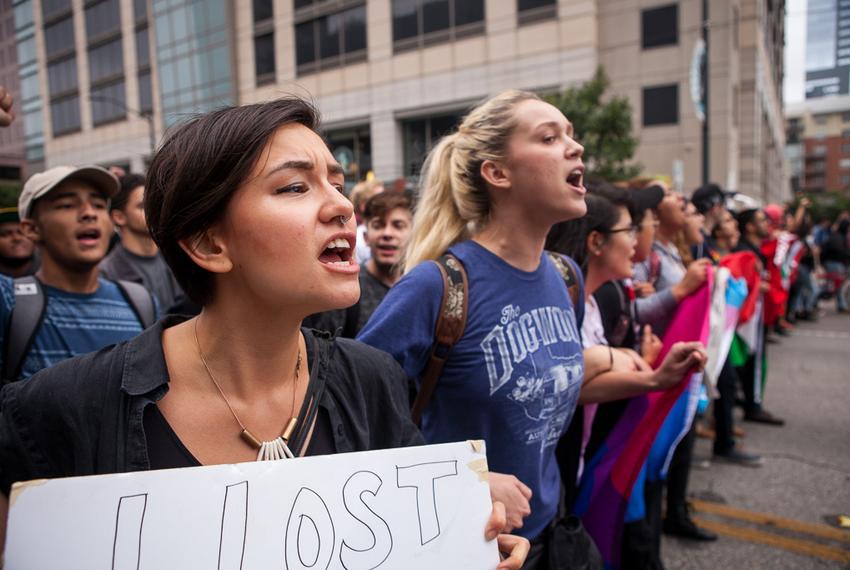By Courtney Schwing
I came out to my parents a few times.
I was 13 when I told them I had a girlfriend, 15 when I tried to explain that I still liked women and 22 when I told my mom I was in love with a girl from New York. In return my mother started drinking heavily and forced me to tell my father.
The day I told my father for the last time that I believed I was gay, my knees were buried in our gravel driveway and I cried hysterically.
My dad had made it clear my whole life that he was not supportive of the LGBTQ community and never took my confessions seriously until that summer day.
“You’re gay, aren’t you?” he said.
“Yes,” I responded.
“I still love you,” he said.
Trying to explain to my family that I would one day want to marry a woman was a difficult concept for them to understand. It wasn’t a “traditional” or “normal” idea, which led me to consistently argue that those terms are subjective. However, I knew that it wasn’t traditional nationally, and especially in Texas.
Those who oppose same-sex marriage frequently argue that it’s morally wrong. When did it become morally wrong to be in a committed and healthy relationship?
A common rebuttal is that same-sex relationships are forbidden according to most religious doctrine but primarily with Christian emphasis.
When did America become tolerant of only one religion?
Currently, there are 37 states that have legalized same-sex marriage while seven states are pending further action. Four states have a marriage case pending before the U.S. Supreme Court and two others have filed lawsuits. The Supreme Court is expected to rule in June.
One of the most perturbing ideologies behind the campaign for same-sex marriage is that when the term “same-sex marriage” is utilized it creates differentiation between all couples that marry.
Terms like “same-sex” and “opposite sex” marriages do not promote marriage equality.
The term “marriage” in itself is connotative of religious ceremonies. By using the term, the LGBTQ community is assimilating itself with those whom argue against the validity of marriage equality. Instead, using terms that are synonymous with the definition of marriage would alleviate animosity from those who believe their religious rights are being imposed upon.
Just like any historical document created, the U.S. Constitution is culturally influenced. It was written in a time when Protestantism was the dominant religion. Because of this, said religion was the main influence in determining what was included in the Constitution; therefore, the U.S. Constitution and most state’s constitutions mimic religious values.
Times change, but that doesn’t mean that we re-write and diminish a document that has withstood the tests of time. We have, however, created amendments to accommodate the evolution of the United States.
Marriage equality needs to be one of those amendments.
On Feb. 17, Travis County Judge David Wahlberg waived a 72-hour wait period for Sarah Goodfriend and Suzanne Bryant to be married. The couple were married with their daughters watching. Gov. Greg Abbott, Lt. Gov. Dan Patrick and Attorney General Ken Paxton all denounced the ruling.
Abbott said that he is “committed to ensuring that the Texas Constitution is upheld.”
Despite the Texas Constitution clearly defining marriage, the actions performed by Wahlberg prove the inclinations of the changing times and that an amendment would be welcomed.
The Texas Constitution is discriminatory against the LGBTQ community. Some of the justifications mimic the same discriminatory rhetoric of the Civil Rights movements of the ‘60s. Nowhere in the U.S. constitution is marriage defined. Only state constitutions provide definitions.
However, many people — some of them legal experts and judges — feel these state constitutions violate the Constitution. Their stance is that marriage bans violate the 14th Amendment by discriminating against people who identify as LGBTQ, excluding them from equal protection of the law.
Considered to be one of the Reconstruction Amendments, the 14th Amendment was originally created to assist former slaves after the Civil War. There are five sections to this Amendment, the sections being violated are 1, 2 and 3.
Section 1 explains that no state shall create laws that restrict citizens of the U.S. from their civil liberties. Section 2, the Citizenship Clause, defines citizenship and was created originally to include black people as citizens. Section 3 presents the Equal Protection of the Law Clause.
This clause was implemented as a response to the Black Codes, ultimately meaning that all citizens are treated equally under the law.
States, such as Texas, have created marriage bans and laws that define marriage as being between one man and one woman, essentially discriminating against LGBTQ people and violating Section 1 by creating a law that infringes on their civil right to marry.
As an American citizen any LGBTQ person is allowed the same freedoms as other U.S. citizens, showing that marriage bans are violating the Citizenship Clause. Lastly, under the law all persons identifying as LGBTQ are to be protected as dictated by the Equal Protection Clause, yet again these marriage bans are in direct violation.
Marriage bans are unconstitutional and are treading upon American citizens’ basic rights and civil rights. This must end.
The United States is better than its citizens’ discrimination and prejudice. We are one step closer to proving that we are a land of freedom.








Clyde Baker • Mar 25, 2015 at 5:54 pm
End it must and well past time. Good article.